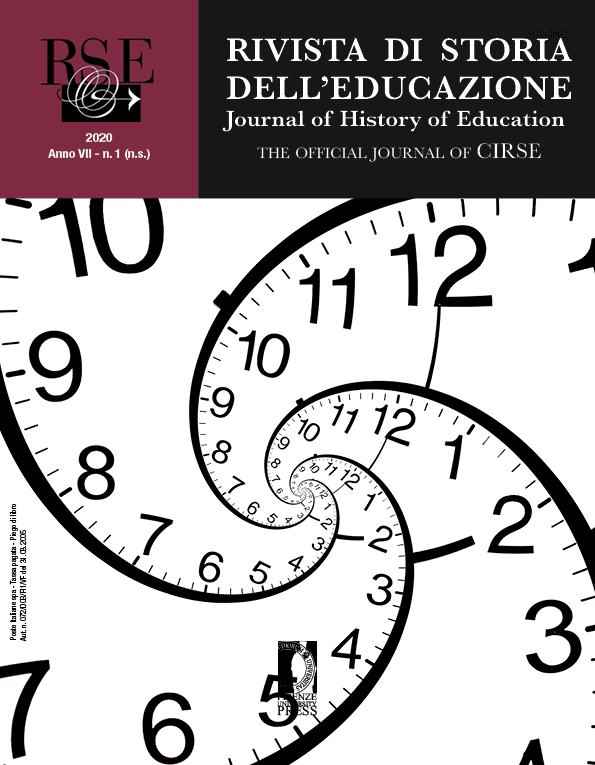Non solo ”abbiccì”. Istruzione e sviluppo nel sud Italia 1861-1914 (ITALIAN) (ENGLISH)
The difference between the regions of northern and southern Italy has always been the subject of debate and scholarly reflection. The focus of this call for papers, within the context of PRIN (Project of Significant National Interest)2017 Education and development in southern Italy (1861-1914), aims to update the historiographical discussion on key aspects of the evolution of education and training in the nineteenth and twentieth centuries and to study the problems that the “Mezzogiorno” faced especially with regard to the formation of human capital.
The research question, to which various scholars will respond, according to their disciplinary competence, can be summarized in the following questions. Various scholars, from different disciplinary positions, will address the following questions: is it possible to document, on a quantitative level, the importance of education for Italian development in the nineteenth and twentieth centuries? How can we verify the impact that investment in literacy, in a broad sense, has had on the country’s economic growth and social dynamics?
We particularly welcome essays that highlight regional differences in schooling, the quality of education and learning outcomes in the southern regions, and the economic return deriving from education and training.
The special issue also intends to promote a dialogue across disciplinary and geographical barriers and between researchers by welcoming contributions dealing with:
- the social and economic condition of pupils;
- school attendance;
- school environments and teaching methodologies;
- the quality of education and academic results;
- the construction of new schools and other educational institutions;
- state, quality and location, in the territorial context, of the school buildings
- teacher education and training;
- male and female teacher salaries;
- teacher quality: socio-cultural origin, background, habits and updating methods
- school hygiene;
- the formation of human capital;
- economic growth;
- national and local education policies and finance;
- health indicators of the territories;
- ideologies and mechanisms devices for social control.
As an interdisciplinary research group we are looking for articles by scholars involved in the fields of the history of education, schooling and literacy, but also – in a broader perspective – colleagues interested in cultural studies, economic, social, anthropological, political and legal history.
On a methodological level, the call also provides an opportunity to value often neglected local archives and the quantitative and statistical data drawn from sources not yet explored, which can supplement or challenge official censuses.
In addition to the rigorous statistical analyses of regional school differences after political unification, qualitative research reflecting on the effects of the spread of literacy on culture and society, are welcome.
The study of topics such as special education, technical education, prison education, female education, adult education and investigations into the legacy of ideas that have focused on the right to literacy in modern and contemporary history, could constitute further areas for analysis.
Calendar
– By April 19, 2021, authors are invited to send an extended abstract (of about 800 words) in which they must describe their contributions according to the contents indicated for this special issue. The abstract should provide an introduction, the main topic to be examined, the theoretical frame of reference, the relevant scientific literature already existing on the subject, the methodology adopted, key bibliography and, if necessary, an appendix with data and tables. Authors are also invited to include a short biographical note (approximately 75 words).
The editors of the special issue will evaluate the abstracts according to the priorities highlighted here. They may be helped by anonymous experts.
– Accepted authors will be notified by May 20, 2021 and will then be invited to submit full articles by October 10, 2021. Contributions must not exceed 8,000 words (approximately 45,000 characters inclusive of spaces), with notes and bibliography). The articles must comply with the editorial conventions of RSE – Rivista di storia dell’Educazione visible at the following sites: https://www.dropbox.com/s/ne830zn2n9x88tk/Editorial%20guidelines%20RSE%20open%20access%20FIN%20EN.pdf?dl=0
All the articles will be subject to anonymous double review. Authors will receive feedback on their articles approximately by January 31, 2022.
– After the review the authors will have more than one month to make corrections. The final version must be submitted by March 20, 2022.
The launch of the special issue is scheduled for June 2022.
Editors of the special issue and their emails for the forwarding of materials (please note: all communications must be sent to all editors with the subject line “proposal for RSE Education and Development article”:
– prof. Stefano Lentini stefano.lentini@unict.it
– prof. ssa Brunella Serpe brunella.serpe@unical.it
– prof. ssa Caterina Sindoni csindoni@unime.it
– prof. Fabio Pruneri pruneri@uniss.it
For editorial information see
RSE Home page: https://www.rivistadistoriadelleducazione.it/index.php/RSE
For editorial matters:
Prof. Pietro Causarano segreteria@cirse.it

